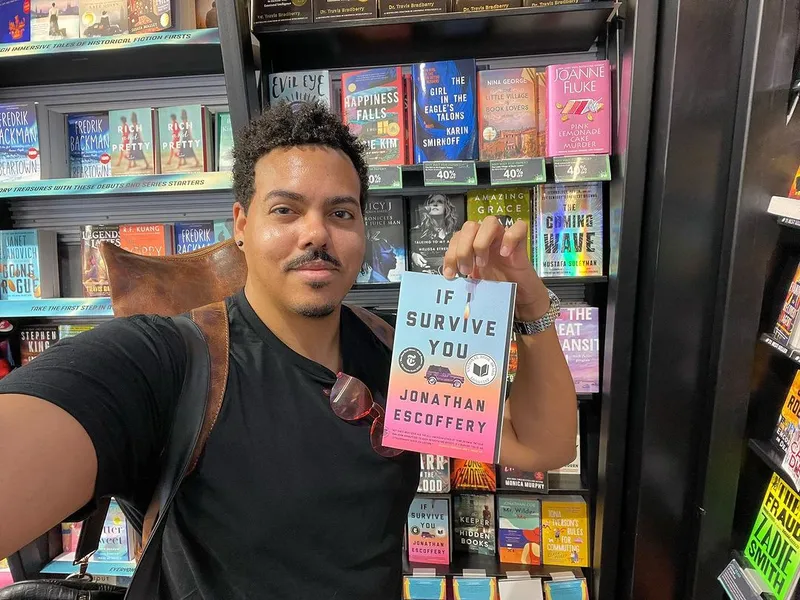Life in America from a Jamaican lens makes 'If I Survive You' a fascinating read about race, belonging
Jonathan Escoffery’s debut uses local dialect and cultural separation to bring out the conflicts of survival that divides a family over time.
Debut collection of short stories If I Survive You by Jonathan Escoffery has the bare bones of a novel taking shape. But the author’s choice to make it a group of speedily narrated short stories about a family moving to the United States of America (USA) from Jamaica to survive works effectively. A short story can up the tempo and intensity of experiences that its characters feel within a brief and specific period of time without being bound to pressures of continuity in a novel.

Jonathan Escoffery with his debut book If I Survive You
Man Booker Prize-shortlist The Bee Sting by Paul Murray is an immersive story of a family’s unravelling
Chronicling the of Sanya and Topper, who left Jamaica in the 70s to give their son, Delano, a secure life and education, the short stories highlight the complexities of the immigrant experience in America through their lives here.
Trelawney, the son born in America, is the sensitive one, much to the chagrin of his stronger elder brother and father, both of whom work in building contracts and landscaping. Their mother, Sanya, has to deal with indifference from her husband, disillusion, survival, and a move towards independent living in her later years.
The first story, In Flux, is a riveting potted history of the family setting up roots in a plot of land in a new country that is plagued by weird occurrences right from the start. When Trelawney has to tackle the difficult question of ‘What are you?’, directed at his racial origin, at school, his mother’s take on prevalent American thinking is explained in her answer, “I was never asked such stupidness before coming to this country. If someone asks you … tell them you’re a little of this and a little of that.”
Her astute answer doesn’t help the sensitive boy find the best coping mechanisms through his parents’ volatile marriage and school life in a racially slanted society.
Eight interconnected stories offer a nuanced overview of living in Florida which has a multi-ethnic social fabric that is stratified and classified as per skin colour in most social interactions. Trelawney has to navigate life through the aftereffects of structural racial bias, live through the damage caused by Hurricane Andrew in 1992 and feel the impact of the 2008 Recession on their divided family.
His journey is one of searching for a sense of belonging while trying to fit in with Dominicans, Puerto Ricans, Jamaicans, and American-born ‘Blacks’. His university days in the Midwest makes him so uncomfortable with the racial ambiguity that he hops into a cab and tells the driver, ‘Take me to Black people’. The destination of this ride confuses him some more, adding to his disappointment.
Trelawney’s constant quest for identity and fraternity drives his father, Topper, to call him ‘defective’, wondering if higher education has reduced his son to a ‘soft’ overthinker without any purpose.
His experiences don’t offer a straightforward route to success, with situations like living out of his car, and struggling to put together $20 at an important juncture in his life.
Stories about the lives of young people like him in his native land, Jamaica, appear in his grant based research journey, where he finds a similar sense of dislocation and disappointment from his father, in the experiences of his cousin, Cukie (Splashdown).
The final story, which also serves as the title of the book, has such a stunning end to its absurd events that the dominant theme of confusion and dislocation makes Escoffery’s characters not just feel real, but a reflection of each one of us, driving empathy for their struggle to belong in America.
The most attractive part of If I Survive You is its narrative style. Escoffery has written most of it in Jamaican dialect, an adaptation of English localised in an island nation that has a mixed racial historical origin through colonial trade and labour. Thoughts and expressions of its characters are staccato, short and direct, making an immediate impact and sometimes, making you pause for a second to take it all in.
Much of what happens is in vivid visual writing: “The croaking lizards scatter over the stucco wall as you pace the length of the front yard. Trashmore’s funk fumes burn in your lungs, and as you work yourself up, the stink laminates your skin, slowly suffocating you.”
This detailed descriptive style could well make the reader disconnect from the book in context, but if one were to savour it, it grows on you and begins to underline the core experiences of the writer-unclear but real.
If I Survive You is an immersive read and a window into the lives of immigrants from a smaller community and nation. It is a telling comment on the tendency of standardisation of people based on their skin colour in the USA. It is a definite stand-out novel and is worth reading at leisure for its refreshing and relevant stories.
Rating: 4.5/5
The winner of the Man Booker Prize 2023 will be announced on November 26, 2023.
Edited by Affirunisa Kankudti







![[Product Roadmap] How Zilingo built one of the largest tech ecosystems for retail merchants in Southeast Asia](https://images.yourstory.com/cs/2/a9efa9c02dd911e9adc52d913c55075e/Product-road-map-1600172543625.png)

